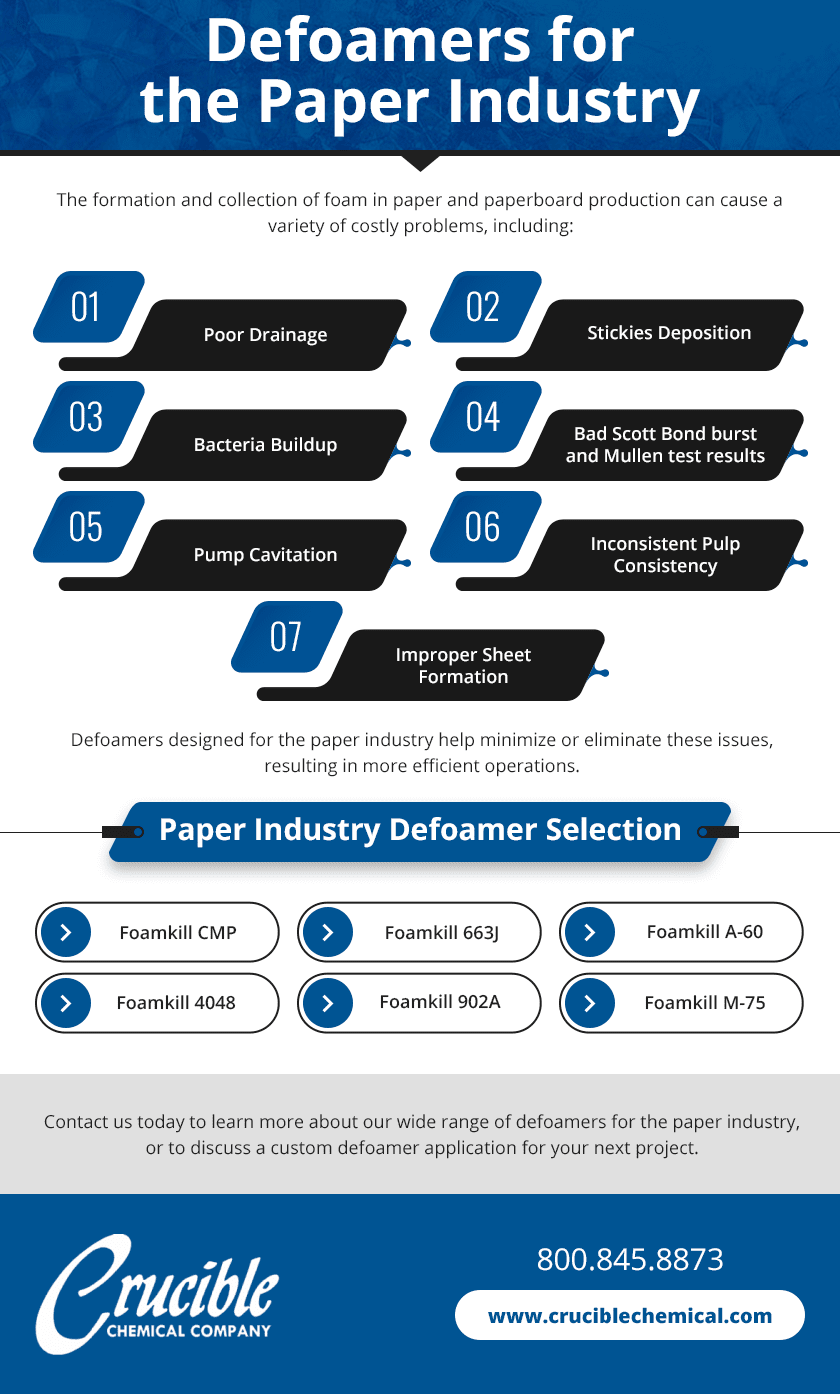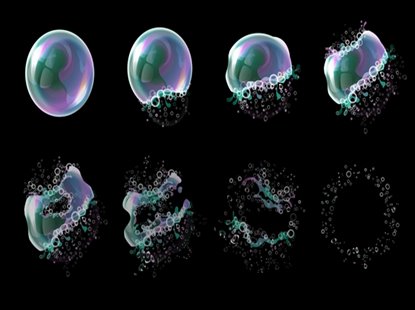Discover the Top Advantages of Using Defoamers in Industrial Processes
The utilization of defoamers in commercial processes offers a variety of engaging benefits that can boost operational performance and product top quality. By efficiently controlling foam manufacturing, these agents not only maximize material circulation however likewise add to considerable cost reductions and improved sustainability. Their application covers numerous industries, which raises inquiries regarding their duty in mitigating environmental effect while ensuring regular result. Understanding these benefits is vital for sectors aiming to refine their processes. The implications of embracing defoamers might be a lot more profound than originally perceived. What certain advantages could your organization harness?
Enhanced Process Performance
Enhancing commercial processes commonly includes dealing with lathering concerns, which can prevent functional effectiveness. Foam formation can hinder the correct functioning of equipment, minimize the efficient use of sources, and complicate the monitoring of crucial parameters. By applying defoamers, markets can successfully alleviate these problems, resulting in structured operations and boosted productivity.
Defoamers work by destabilizing the foam framework, permitting for fast collapse and substantial reduction in foam quantity. This action not only improves the circulation of materials through tools, such as mixers, reactors, and pipelines, however also decreases disturbances triggered by foam overflow. Consequently, equipment downtime is lowered, permitting an extra constant and effective manufacturing process.
Furthermore, using defoamers can bring about decreased power usage. With much less foam to handle, compressors and pumps can run a lot more effectively, resulting in lower operational costs and a general enhancement in process throughput. Eventually, the critical use of defoamers not only addresses immediate frothing obstacles but likewise contributes to a much more reliable industrial environment, cultivating a competitive benefit in a requiring market.
Improved Item Top Quality
The assimilation of defoamers in industrial processes plays a vital function in boosting item quality. By efficiently regulating foam development, defoamers contribute to the uniformity and uniformity of last products. Excessive foam can cause aeration, which adversely influences the structure and stability of formulations, especially in sectors such as food and pharmaceuticals, drinks, and layers.

Moreover, defoamers assist in better mixing and diffusion of components, resulting in homogeneity in formulas. This is essential in applications where precise active ingredient ratios are important for performance and safety. In addition, the removal of foam can decrease the threat of contamination throughout production, more securing product integrity.
Eventually, by boosting item high quality, defoamers not only improve customer fulfillment but likewise reinforce brand name credibility. Their function in keeping top notch standards highlights their value in modern commercial procedures.
Cost Decrease Advantages
Applying defoamers in industrial procedures can bring about substantial expense decrease advantages. By effectively regulating foam development, defoamers decrease item loss throughout manufacturing, consequently enhancing material usage. This decrease in waste equates directly into reduced resources expenses, enhancing total operational effectiveness.
Furthermore, the use of defoamers can lower energy intake. Too much foam can hinder equipment performance, bring about boosted power needs to keep production levels. By mitigating foam, defoamers facilitate smoother operations, permitting equipment to run extra effectively and reducing power expenses.

Furthermore, defoamers can shorten handling times. By making use of defoamers, sectors can simplify their procedures, leading to faster turnaround times and boosted throughput.

Environmental Influence Mitigation
In industrial processes, using defoamers plays a vital you can look here function in mitigating ecological impacts associated with foam generation. Foam can bring about significant functional ineffectiveness, causing increased emissions and waste generation. By effectively managing foam, defoamers assist preserve process performance, thereby minimizing the total environmental footprint of operations.
In addition, extreme foam can overflow control systems, causing spills that may infect soil and water sources. Defoamers aid decrease this danger by ensuring that foaming does not exceed recommended limitations, promoting conformity with ecological laws. This aggressive method not only safeguards environments yet likewise improves the sustainability of industrial methods.
Furthermore, making use of defoamers can decrease energy usage in various processes. defoamers. Reducing foam development decreases the Web Site demand for additional energy-intensive measures, such as boosted frustration or pumping, which might or else be essential to take care of foam. The fostering of defoamers lines up with wider sustainability objectives by promoting energy performance while decreasing the carbon impact of industrial activities.
Ultimately, incorporating defoamers into industrial procedures is a tactical measure that supports environmental stewardship and responsible resource management.
Adaptability Throughout Industries
Across various sectors, defoamers demonstrate amazing flexibility, adjusting to the certain needs of varied applications. In the food and beverage market, as an example, defoamers are vital to preserving item quality by avoiding foam formation throughout handling, which can impact structure and flavor. In the pharmaceutical market, defoamers make sure the stability of formulas, improving item efficacy and consistency.
In the chemical production world, defoamers promote smoother procedures by minimizing foam in response vessels, therefore boosting yield and decreasing downtime. The paper and pulp industry depends on defoamers to enhance the performance of pulp handling and paper production, guaranteeing optimum item honesty. Furthermore, in wastewater treatment facilities, defoamers play a vital duty in managing foam during aeration processes, leading to improved therapy outcomes.
The convenience of defoamers encompasses the oil and gas market, where they help in managing foam in boring liquids and production procedures. By tailoring formulas to meet particular market requirements, defoamers serve as crucial tools that improve operational performance, item quality, and total process effectiveness throughout a wide range of fields. Their flexibility underscores their value in contemporary industrial applications.
Conclusion
In conclusion, the usage of defoamers in industrial procedures offers many benefits, consisting of enhanced effectiveness, improved product high quality, significant expense reductions, and favorable environmental impacts. The integration of defoamers represents a critical method to attending to obstacles linked with foam administration in various making environments.
Ultimately, the calculated hop over to here use of defoamers not just addresses instant frothing challenges but likewise adds to a more efficient industrial ecosystem, promoting a competitive benefit in a demanding market.
In commercial processes, the use of defoamers plays a critical role in mitigating ecological impacts associated with foam generation. By effectively regulating foam, defoamers help maintain procedure performance, consequently decreasing the total environmental impact of operations.
Additionally, in wastewater therapy centers, defoamers play a crucial role in regulating foam during oygenation processes, leading to improved treatment end results.
